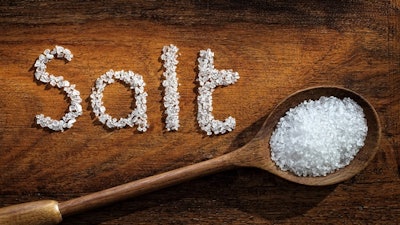
WASHINGTON (AP) — The Obama administration is pressuring the food industry to make foods from breads to sliced turkey less salty, proposing long-awaited sodium guidelines in an effort to prevent thousands of deaths each year from heart disease and stroke.
The proposed guidelines released Wednesday are voluntary, so food companies won't be required to comply. But the idea is to persuade companies and restaurants — many of which have already lowered sodium levels in their products — to take a more consistent approach.
The guidelines set recommended limits for about 150 categories of foods, from cereals to pizzas and sandwiches. Some targets have a two-year goal, while others have a 10-year goal.
"The totality of scientific evidence, as reviewed by many well-respected scientific organizations, continues to support lowering sodium consumption from current levels," said Susan Mayne, director of FDA's Center for Food Safety and Applied Nutrition. "In fact, it's very difficult in the current marketplace not to consume too much sodium."
Americans eat about 1½ teaspoons of salt daily, or 3400 milligrams. That's about a third more than the government recommends for good health and enough to increase the risk of high blood pressure, strokes and other problems. Most of that sodium is hidden inside common processed foods and restaurant meals.
Sodium content already is included on existing manufacturers' food labels, but the government had not previously set specific sodium recommendations.
The guidelines are long-delayed. The Food and Drug Administration first said it would issue voluntary guidelines in 2010, after an Institute of Medicine report said companies had not made enough progress on reducing sodium and advised the government to establish maximum levels for different foods. The FDA decided to go with a voluntary route instead.
The delays came as food companies balked at the idea of government guidelines, pointing to myriad efforts already underway to reduce sodium. The food industry has also pointed to a newer, 2013 IOM report that said there is no good evidence that eating sodium at very low levels — below the 2,300 milligrams a day that the government recommends — offers benefits.
Some companies have worried that though the limits will be voluntary, the FDA is at heart a regulatory agency, and the guidelines are more warning than suggestion. But the wait means that Obama administration officials won't be around to see if individual companies follow the guidelines. A new administration will be tasked with making the proposed guidelines final, as they could take a year or more to complete.
If companies do eventually comply with the guidelines, Americans won't notice an immediate taste difference in higher-sodium foods like pizza, pasta, bread and soups. The idea is to encourage gradual change so consumers' taste buds can adjust, and to give the companies time to develop lower-sodium foods. Some companies don't advertise sodium reductions at all, in hopes that consumers won't even notice.






















